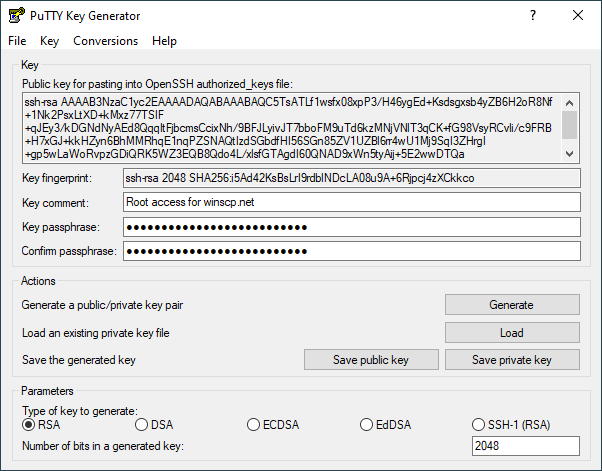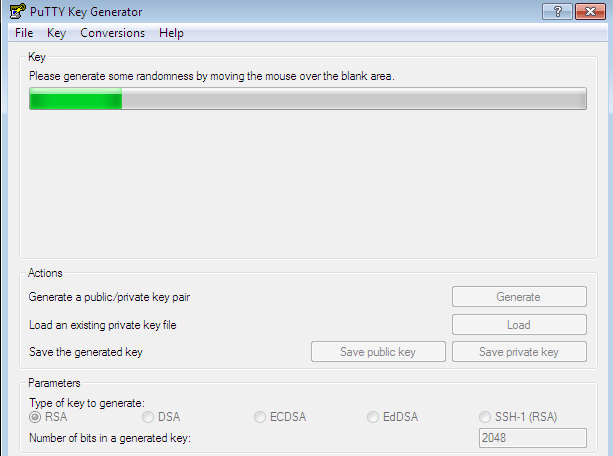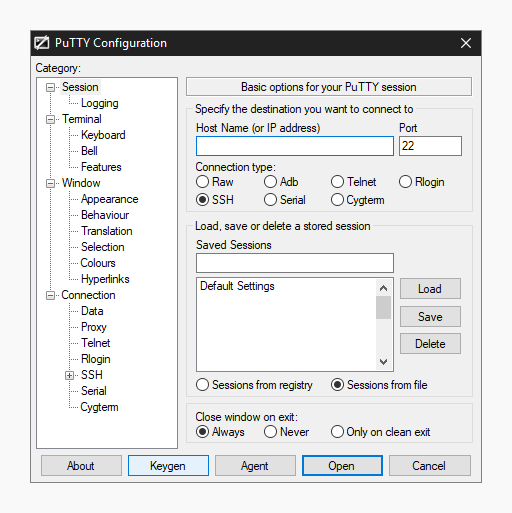

- Putty ssh keygen windows how to#
- Putty ssh keygen windows install#
- Putty ssh keygen windows generator#
Putty ssh keygen windows generator#
You will see the PuTTY key generator dialog box on your screen.For the same, go to Windows -> Start Menu -> All Programs -> PuTTY -> PuTTYgen.
Putty ssh keygen windows install#
Once you install the PuTTY on your machine, you can easily run PuTTYgen.
Putty ssh keygen windows how to#
Below is the complete guidance about how to generate RSA key in the Windows operating system: PuTTYgen is used to generate public or private key pair for creating SSH keys. For Windows, the software interface is PuTTYgen.exe, whereas, for Linux OS the command-line adaptation is available using SSH commands.

The aforementioned public-key cryptosystems principally focus on secure data transmission and digital signatures.Īlthough PuTTYgen collects keys in its native file format i.e.ppk files, the keys can easily be converted to any file format. The key generation utility – PuTTYgen can create various public-key cryptosystems including Rivest–Shamir–Adleman (RSA), Digital Signature Algorithm (DSA), Elliptic Curve Digital Signature Algorithm (ECDSA), and Edwards-curve Digital Signature Algorithm (EdDSA) keys. 1.3.3 Types of Keys Supported on PuTTYgen.1.3.2 Various Command Line Options of PuTTY in Linux.1.3.1 Generate Key Pair for Authentication in Linux.Now we have the analog of pageant running, an agent with no keys loaded.īy itself will add (by default) the private keys listed in the default identity files in ~/.ssh. I found that somewhere on the 'net and it ended a few hours of beating my head against the wall. That $SHELL was the magic trick I needed to make the agent run and stay running. The method that worked for me was to use: The Linux analog to this scenario is accomplished using ssh-agent (the pageant analog) and ssh-add (the analog to adding a private key to pageant). host would, of course, have to be holding the public key in ~/.ssh/authorized_keys. The analog for this is that Linux, acting as an ssh client, has an agent holding a decrypted private key so that when TCSgrad types "ssh host" the ssh command will get his private key and go without being prompted for a password. Then, the ssh client, putty, can log in to machines where his public key is listed as "authorized" without a password prompt. That is, there is an agent (pageant) which holds a decrypted copy of a private key so that the passphrase only needs to be put in once. I think what TCSgrad was trying to ask (a few years ago) was how to make Linux behave like his Windows machine does. Should convert an existing puttygen public key to OpenSSH format. ssh-keygen -i -f keyfile.pub > newkeyfile.pub You've sent this key back to the user 15 times. Password even though everyone else's keys are working fine, and No error message in the auth log except, no key found, trying HOWEVER, sysadmins, you invariably get the wonky key file that throws Key pair in puttygen, copy the public key and paste it into a textįile with the extension. The Solution: When you get to the public key screen in creating your Puts some data in different areas and adds line breaks. Public key using puttygen it won't work on a linux server. However, what isn't addressed is that when you save the Puttygen provides a neat utility to convert a linux private key to The most common way to make a key on Windows is using Putty/Puttygen. I keep forgetting this so I'm gonna write it here.

If all you have is a public key from a user in PuTTY-style format, you can convert it to standard openssh format like so: ssh-keygen -i -f keyfile.pub > newkeyfile.pub


 0 kommentar(er)
0 kommentar(er)
